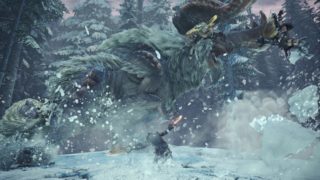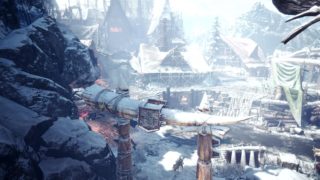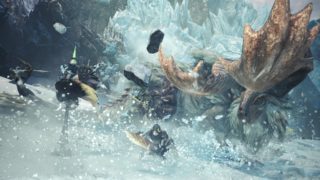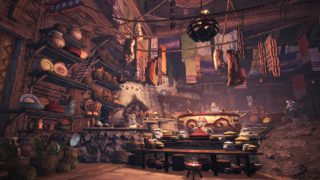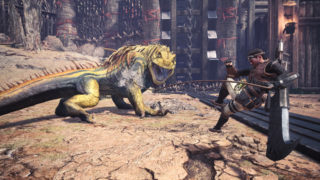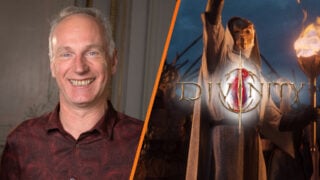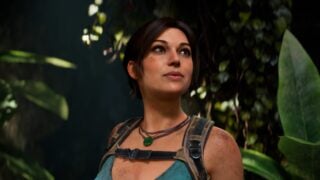Monster Hunter: ‘We’ve finally built a great base to work from’
Producer and director discuss the upcoming expansion

Monster Hunter World was a huge hit for Capcom, breaking the publisher’s all-time sales record for an individual title.
Producer Ryozo Tsujimoto tells VGC the secret to the game’s global success can be put down to two things; its global release (previous games were released in Japan first) and a move away from Japan-friendly portables to home consoles.

“Finally, now with Monster Hunter World we’ve been able to bring the game to home consoles and release it worldwide at the same time, which has allowed us to create a cohesive, global community for the game which wasn’t possible before,” he said.
With the game’s major expansion, Iceborne, due out on September 6, we caught up with Tsujimoto and game director Fujioka Kaname to discuss the core game’s phenomenal success.
What’s your secret for making this game appeal to a global audience, as opposed to its more Japan-focused predecessors?
Tsujimoto: Our success in the west with Monster Hunter World comes down to a lot of things coming together that we didn’t have before with previous titles. We were obviously releasing previous games in the West and we wanted them to appeal to those players, but when we gathered post-release feedback there were a number of key requests which were always there.
Number one, players wanted us to release our games on consoles, because in the years before Monster Hunter World he had been focused on portables, which was something that was maybe holding us back in the West. We found that Western players want a console experience on a big screen TV at home.

Another factor was that we didn’t release our games simultaneously globally until Monster Hunter World: we released in Japan first and then localised it later. So by the time the games arrived in the West, fans had already seen a lot of the news and things coming out of Japan already and were not really getting to experience the excitement in real-time.
Finally, now with Monster Hunter World we’ve been able to bring the game to home consoles and release it worldwide at the same time, which has allowed us to create a cohesive, global community for the game which wasn’t possible before. Speaking as developers and as Capcom, It’s been great to see how many people have supported the game, how many fans have stuck with us and how willing they are to help new players. I think all of those factors have been essential.
Are there any additional areas you think you can continue to improve in the future, in order to build the series’ global appeal even further?
Kaname: Yeah, we always believe there is more to work on and improve. Monster Hunter World is the first time we’ve had fully voiced cut-scenes in the series for example, which was a great way to get players invested in the storyline of the game. Also, online communication between players is essential for a cooperative game like this, so I think we can always push to do better in terms of how to get players together and help them communicate with each other.
“Speaking as developers and as Capcom, It’s been great to see how many people have supported the game, how many fans have stuck with us and how willing they are to help new players.”
While we’ve finally managed to develop a great base to work from in terms of a global community, we know we can’t rest on our laurels. Iceborne is part of that, where we want to keep working on the game and improving it.
How has Capcom managed to find success globally with its recent titles, where other Japanese publishers perhaps find it more difficult to do so?
Kaname: Capcom has a really great stable of series and brands, which is a really strong position to work from. Over the years different titles have come and gone in terms of when we’ve added new titles to each series, but as a company Capcom gives the R&D teams a lot of freedom to create the kind of games they want to. We’ve been able to keep our different series including Monster Hunter up to date as we’ve developed them.
Things like Monster Hunter World are almost like taking an existing series and remaking it for the needs of the current gaming generation, and I think we’ve been able to do that because like I said, we can rely on such a great brand identity that we have with all our characters and franchises.
What’s the company’s stance on creating new game franchises? Is that still important?
Tsujimoto: Definitely. We’re not giving up on the idea of creating new characters and series, it’s just we’re doing quite well at the moment with bringing new, fresh approaches to our existing series. That’s working out very well for us but we’ll never take our eye off creating original games in the future.
Do you think it has become more challenging to create new game franchises that resonate globally?
Kaname: I think what our fans value is the uniqueness that Capcom brings to the games and characters that we create. The Western players find Japanese approaches to design very unique in the first place, but even within that context Capcom has set itself apart.
While you will sometimes have to readjust your ideas to make sure that they really resonate with players worldwide, I think that what players want is for us to be ourselves. Even these days, I’m confident we can continue to create these new experiences, titles and characters that will resonate with people, not just in our home market of Japan but everywhere in the world.
“I think what our fans value is the uniqueness that Capcom brings to the games and characters that we create. The Western players find Japanese approaches to design very unique in the first place, but even within that context Capcom has set itself apart.”
What kind of post-release support can fans expect with Iceborne? Are there any plans to add locations beyond the Hoarfrost Reach for example?
Tsujimoto: I don’t know if we will specifically look to add new maps, but we are going to release title updates after Iceborne is released, similar to how we did with Monster Hunter World. That was a great vehicle for us to add fresh new content that you could play in the long term; event quests, seasonal events… we even added some new monsters.
We’re currently developing our plans for what content will come to Iceborne via future title updates after launch, so we’ll have to see what we come up with. We don’t know yet if it’s going to be literally as long as the support cycle we had for Monster Hunter: World, but we will take a similar approach.
We have some plans we will develop, then after the game comes out we have to really watch the community and see what they’re liking or disliking, then we can find ways to make improvements, balance changes and so forth. We have a framework in mind, but we will be quite flexible in adapting that for the needs of players once we see how the game lands.
Kaname: It’s the reality of game development that we can’t just come up with an idea straight away after the game comes out and put it in motion: we have to do a certain amount of resource planning before then. So we’re putting that in place now and if we have to make changes and additions later, we’ll handle that as best as we can when the time comes.
Are there any plans to help new players who didn’t play Monster Hunter World get up to speed?
Tsujimoto: We are thinking about what we can do to help new players who are going to be jumping in to the main game for the first time, and how we can help them rank up quicker in order to play with their friends in Iceborne. We’re trying to think about what we can do about that and we’ll have concrete details to announce later.
One of the major new mechanics in Iceborne is the Clutch Claw grappling hook. How have you balanced that to make sure players don’t just spam it?
Kaname: We wanted the Clutch Claw to be a really satisfying and useful addition to the player’s arsenal but it can’t be something that players can just use over and over again. It’s another card in your deck, but it isn’t the only thing that you’re going to want to be doing.
Monster Hunter is about reading the situation, reading the monsters’ behaviour and then using the right tool or weapon. The Clutch Claw is something that you’ll want to use at the right time, but if you try to use it while a monster is attacking you for example, you’re not going to be able to hook on successfully. It’s not an instant win.
If you buy the Master Edition then you’ll be able to use it right from the start of the Monster Hunter World storyline, which going back to your previous question could actually be a handy way of getting through that a little bit faster, because the monsters in the core story are not designed with the Clutch Claw in mind.








